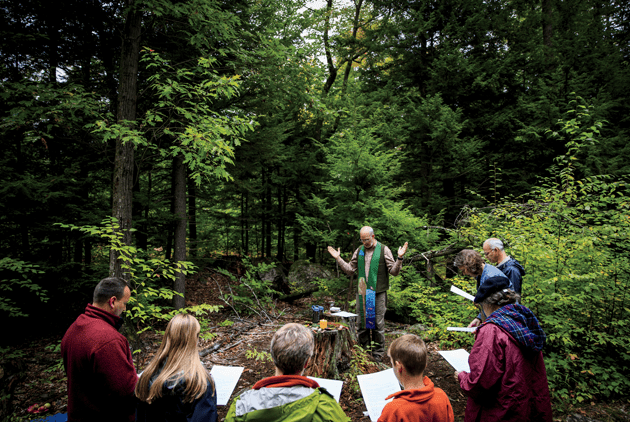Commitment to the environment
Anglicans have long been concerned about environmental issues and its impact on the people and the planet.
This is reflected in the The Five Marks of Mission, an important mission statement which describes the Anglican communion’s common commitment, including the commitment to protect and conserve the environment and life on our beautiful planet.
The Mission of the Church is the mission of Christ:
- To proclaim the Good News of the Kingdom
- To teach, baptise and nurture new believers
- To respond to human need by loving service
- To seek to transform unjust structures of society, to challenge violence of every kind and to pursue peace and reconciliation
- To strive to safeguard the integrity of creation and sustain and renew the life of the earth
“Learning to relate to nature, to birds and trees and animals, is part of coming to ourselves. It is part of an interior conversion. It is also the discovery of who we are, in relation to Earth and its creatures, our human brothers and sisters and God.”
The Diocesan Environment Commission
The Diocesan Environment Commission helps parishes and the Newcastle Anglican to safeguard, sustain, and renew the life of the Earth.
The commission encourages and inspires parishioners to realise issues affecting our environment, and to take responsibility both spiritually and practically so that we all can make a difference and move toward a sustainable future.
One of the most important roles of the commission is to encourage every parish to play a pro-active role in environmental care.
The focus of the commission’s work is:
- Give leadership to the Church and its people in the way in which they can care for the environment.
- Use the resources of God’s creation appropriately and to consider and act responsibly about the effect of human activity on God’s creation.
- Facilitate and encourage the education of Church members and others about the need to care for the environment, use the resources of God’s creation properly and act responsibly about the effect of human activity on God’s creation.
- Urge people to pray regarding these matters.
- The Commission to meet at least four times a year and report to Synod.

EcoCare Resources
In 2002, the Diocese of Newcastle accepted the motion moved at General Synod to implement an Environment Commission and accepted the responsibility of working together as Christians toward a sustainable future.
Bishop Graeme Rutherford, then the Assistant Bishop of Newcastle, was committed to ‘encouraging and inspiring one another to become aware of issues affecting our environment and to take responsibility, both spiritually and practically, for our actions so that we can make a difference toward a sustainable future, and so the Diocesan Environment Commission was established.
The Simplicity Institute
The Simplicity Institute is a non-profit education and research centre which focuses on less energy-intensive ways of living to create a just and sustainable world. The Simplicity Institute’s aim is to promote the vision of a good life and help build a new society based on material sufficiency.
Permaculture Principles
Permaculture principles are design tools based on the concept of permaculture, which integrates agriculture, land, resources, environment, and the people to create mutually beneficial and sustainable systems. The principles guide us to become environmentally conscious, re-design our thinking and behaviours, and build skills and resilience to live in a world of less energy and resources.
The Permaculture Research Institute (PRI)
The Permaculture Research Institute is a not-for-profit organisation specialising in permaculture education & training worldwide, working with individuals and communities to develop sustainable communities using the whole-system approach of permaculture design.
ARRCC Climate Action Kits
Australian Religious Response to Climate Change’s Climate Change Action Kits are comprehensive resources with creative ideas to empower people from different faiths to assist their communities to respond to climate change and care for the earth.
Five Leaf Eco Awards
The Five Leaf Eco-Awards are an Australian ecumenical environmental change program specifically designed for churches and religious organisations. Using a series of non-competitive awards the program assists, inspires and rewards faith communities for taking environmental action and becoming more sustainable in response to God’s call to care for creation.
Anglican Communion Environmental Network (ACEN)
ACEN is a network for those who care for God’s creation. Anglicans and Episcopalians worldwide have long been concerned with environmental issues. From extreme weather to food shortages all of us are affected. Guided by the fifth Mark of Mission members of the Anglican Communion Environment Network strive to safeguard the integrity of creation and sustain and renew the earth. It has links to the Communion Forrest, The Lambeth Call on the Environment and Sustainable Development, Season of creation resources and more.
Season of Creation
Activities and resources to celebrate the Season of Creation are supported by an ecumenical steering committee and a coalition of partners from around the world.
Green Anglicans
Green Anglicans provide many useful resources. Vision: “A church which is striving to safeguard the integrity of creation and sustain and renew the life of the earth” Mission: Resource and inspire Anglicans in the spirituality of Caring for Creation; Inspire and encourage individuals to live sustainable lives; Inspire and equip Churches and Dioceses to practical actions as Earthkeepers; Challenge and network individuals, Churches and Dioceses to prophetic acts of advocacy.
Anglican Church of Australia
Anglican Church of Australia website amongst other things contains, Liturgy and worship, Themes and events resources for environmental themes, stewardship of creation, climate change, sustainable cities and more. There are also “The Prayers of the People” APBA pp172-173, 184-185 and occasional prayers and thanksgivings p202ff.
The Alliance of Religions and Conservation (ARC)
The ARC is a secular body assists major religions of the world in developing their own environmental programs and initiatives based on their own core teachings, beliefs, and practices. It helps forge powerful connections between faith-based communities and environmental groups.
More resources
Love Food Hate Waste
Love Food Hate Waste is a program that helps you avoid food waste, save time and money, and reduce your environmental impact by planning better, shopping smarter, and storing food effectively. The Environment Protection Authority (EPA) manages the program, and it runs in partnership with retailers, food manufacturers, local government authorities, and community groups.
Office of Environment and Heritage
New South Wales government’s Office of Environment and Heritage works with communities, businesses, and governments to protect, preserve, and strengthen the natural environment and heritage. This includes a range of conservation and natural resources programs on sustainability, native vegetation, biodiversity, energy, water and more.
Department of Climate Change, Energy, the Environment, and Water
The Australian federal government’s Department of Climate Change, Energy, the Environment, and Water helps protect Australia’s natural resources, heritage and energy and promotes climate action. You will find useful information on the website.
Commonwealth Scientific and Industrial Research Organisation (CSIRO)
The CSIRO is Australia’s national science agency and one of the largest and most diverse research agencies in the world. CSIRO has a strong commitment to research focused on the environmental challenges facing Australia today.
Many local councils have good information on environmental issues, initiatives, and sustainable practices:
